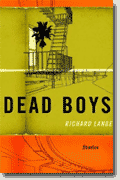Dead Boys
Richard Lange
book reviews:
· general fiction
· chick lit/romance
· sci-fi/fantasy
· graphic novels
· nonfiction
· audio books
· author interviews
· children's books @
curledupkids.com
· DVD reviews @
curledupdvd.com
newsletter
win books
buy online
links
home
for authors
& publishers
for reviewers

 |
Dead Boys: Stories Richard Lange Little, Brown Hardcover 256 pages August 2007 |
|
The grit and grime of youth in Los Angeles, land of dashed hope and abandoned dreams, may be a tired genre in American prose, but it shows little signs of going away. As one of the country’s most easily picked-on cities, LA has received more than its share of literary comments on how awful it is to live there. And anyone who’s heard of Nathaniel West or the Beats may think that everything that’s needed to be said on the topic—the plastic despair, the false hope— is said. While Richard Lange doesn’t stray far from these well-worn themes, he approaches them with an ethos uncommon to the genre. Most narrators feel more like anthropologists, outsider-visitors critiquing a quasi-dystopia from afar. Lange’s characters are voices from within: trapped, desperate, and sometimes bursting at the seams. The authenticity that haunts these stories elevates Lange’s take on this carnival-city well above the common, more than making up for any lack of newness.
But what puts flesh on otherwise crusty, mechanical time bombs is their semi-resigned passivity that comes from the sheer pain of being alive. The narrative rarely uses passive voice, and descriptions are vivid enough to paint a picture in which the paint is already chipping. The protagonists certainly don’t seem like strangers in a strange land, but all the same, there’s a particular detachment from the plot that reflects their dual relationship with their lives: while emotionally involved in their undertakings, they are also alienated. They are full of fissures infected by their environment, which is Lange’s method of balancing the volatile with the downtrodden. Only through these connected motifs of violence and resignation do the characters speak a truth that others have failed to do. It’s easy to make this world seem alien: to make it alienating and realistic, one must first bring the reader inside the protagonist’s world. Lange achieves this spectacularly. I by no means wish to imply that these men are portrayed as innocent victims of a corrupting society that eats away at their souls. Like everything about this world, Lange’s boys tell it best: “I’m confused at what kind of person I am. Good or evil doesn’t get to the heart of it.” Whether judged as good or not, they are trying—desperately—to make lives for themselves. Their goodness and nobility are left to the reader to decide, leaving no easy answers except their aches for salvation. Deeply flawed characters are nothing new to the Nathaniel West world of Hollywood satire, but Lange revitalizes the milieu with sharp stabs of his characters’ pain. Bereft of other comforts, they are forced to rely on “Cheap wine, crack, lies loudly told…bonfires that keep the wolves at bay.” Individual stories haven’t been referred to so far, with reason. While having some individual focus—“Loss Prevention” centers on illusions and fantasies, while “Love Lifted Me” portrays a man who cannot take responsibility for his constant failures—the stories blend into each other. They do so at the cost of uniqueness, the greatest drawback in this collection. The characters, for all their individual mindsets, are all still deviations from a single psychological and literary type, and as the characters and setting are more or less the same, there were more than a few instances where I wanted some variety. The subtle differences between the characters make good pickings for readers who enjoy gnawing away at characters, but the pervading sameness can be overwhelming, and it’s easy to forget a story on the way. This forces me to wonder how much life this genre has left in it, if even Lange’s remarkable efforts can’t bring anything all that new to the table. But given this collection’s excellent contribution to the fiction of urban decay, all through complex, well-crafted storytelling, I’m willing to forgive it. Originally published on Curled Up With A Good Book at www.curledup.com. © Max Falkowitz, 2008 |
|
|
|
 Click here to learn more about this month's sponsor! |
|
| fiction · sf/f · comic books · nonfiction · audio newsletter · free book contest · buy books online review index · links · · authors & publishers reviewers |
|
| site by ELBO Computing Resources, Inc. | |
 This ethos boils up from the depths of the intense first-person narrators, all of whom possess a masculine energy that would disquiet men ten or twenty years their senior. Rarely has the angry young man psyche been explored as well as in these stories, all rendered in a crude, dark poetry: “The sun can seem so cruel…And the trees, the way they just stand there, and every dog in the neighborhood snickering at you. Your own skin feels like a punishment.”
This ethos boils up from the depths of the intense first-person narrators, all of whom possess a masculine energy that would disquiet men ten or twenty years their senior. Rarely has the angry young man psyche been explored as well as in these stories, all rendered in a crude, dark poetry: “The sun can seem so cruel…And the trees, the way they just stand there, and every dog in the neighborhood snickering at you. Your own skin feels like a punishment.”